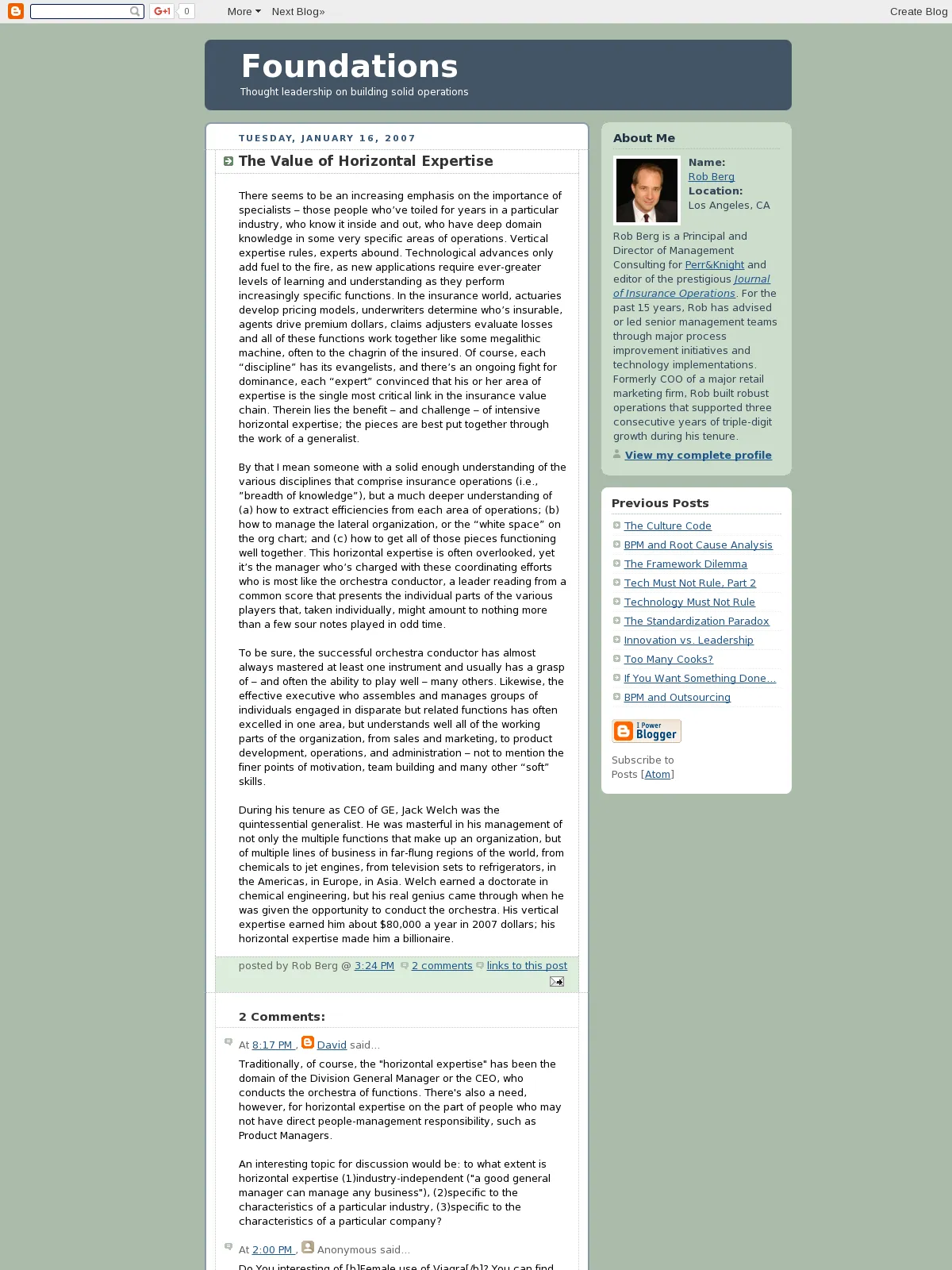The Value of Horizontal Expertise
Blog: BPM Insights - Rob Berg
There seems to be an increasing emphasis on the importance of specialists – those people who’ve toiled for years in a particular industry, who know it inside and out, who have deep domain knowledge in some very specific areas of operations. Vertical expertise rules, experts abound. Technological advances only add fuel to the fire, as new applications require ever-greater levels of learning and understanding as they perform increasingly specific functions. In the insurance world, actuaries develop pricing models, underwriters determine who’s insurable, agents drive premium dollars, claims adjusters evaluate losses and all of these functions work together like some megalithic machine, often to the chagrin of the insured. Of course, each “discipline” has its evangelists, and there’s an ongoing fight for dominance, each “expert” convinced that his or her area of expertise is the single most critical link in the insurance value chain. Therein lies the benefit – and challenge – of intensive horizontal expertise; the pieces are best put together through the work of a generalist.
By that I mean someone with a solid enough understanding of the various disciplines that comprise insurance operations (i.e., ”breadth of knowledge”), but a much deeper understanding of (a) how to extract efficiencies from each area of operations; (b) how to manage the lateral organization, or the “white space” on the org chart; and (c) how to get all of those pieces functioning well together. This horizontal expertise is often overlooked, yet it’s the manager who’s charged with these coordinating efforts who is most like the orchestra conductor, a leader reading from a common score that presents the individual parts of the various players that, taken individually, might amount to nothing more than a few sour notes played in odd time.
To be sure, the successful orchestra conductor has almost always mastered at least one instrument and usually has a grasp of – and often the ability to play well – many others. Likewise, the effective executive who assembles and manages groups of individuals engaged in disparate but related functions has often excelled in one area, but understands well all of the working parts of the organization, from sales and marketing, to product development, operations, and administration – not to mention the finer points of motivation, team building and many other “soft” skills.
During his tenure as CEO of GE, Jack Welch was the quintessential generalist. He was masterful in his management of not only the multiple functions that make up an organization, but of multiple lines of business in far-flung regions of the world, from chemicals to jet engines, from television sets to refrigerators, in the Americas, in Europe, in Asia. Welch earned a doctorate in chemical engineering, but his real genius came through when he was given the opportunity to conduct the orchestra. His vertical expertise earned him about $80,000 a year in 2007 dollars; his horizontal expertise made him a billionaire.
By that I mean someone with a solid enough understanding of the various disciplines that comprise insurance operations (i.e., ”breadth of knowledge”), but a much deeper understanding of (a) how to extract efficiencies from each area of operations; (b) how to manage the lateral organization, or the “white space” on the org chart; and (c) how to get all of those pieces functioning well together. This horizontal expertise is often overlooked, yet it’s the manager who’s charged with these coordinating efforts who is most like the orchestra conductor, a leader reading from a common score that presents the individual parts of the various players that, taken individually, might amount to nothing more than a few sour notes played in odd time.
To be sure, the successful orchestra conductor has almost always mastered at least one instrument and usually has a grasp of – and often the ability to play well – many others. Likewise, the effective executive who assembles and manages groups of individuals engaged in disparate but related functions has often excelled in one area, but understands well all of the working parts of the organization, from sales and marketing, to product development, operations, and administration – not to mention the finer points of motivation, team building and many other “soft” skills.
During his tenure as CEO of GE, Jack Welch was the quintessential generalist. He was masterful in his management of not only the multiple functions that make up an organization, but of multiple lines of business in far-flung regions of the world, from chemicals to jet engines, from television sets to refrigerators, in the Americas, in Europe, in Asia. Welch earned a doctorate in chemical engineering, but his real genius came through when he was given the opportunity to conduct the orchestra. His vertical expertise earned him about $80,000 a year in 2007 dollars; his horizontal expertise made him a billionaire.
